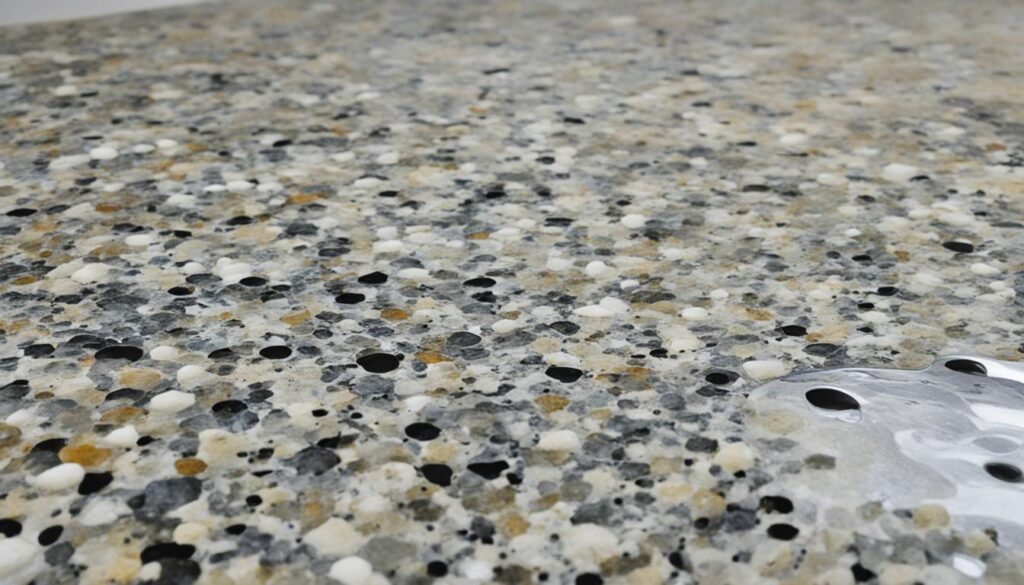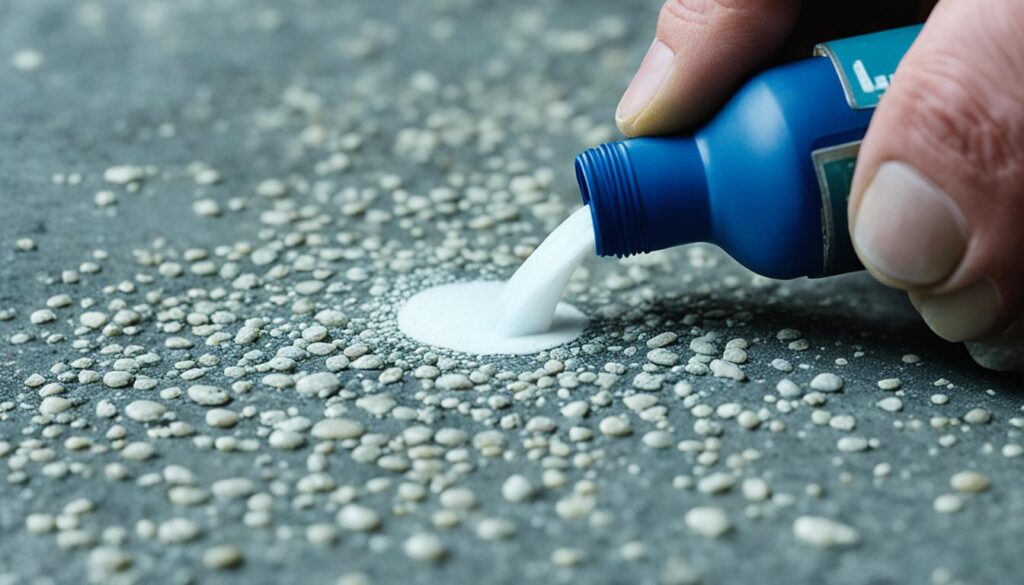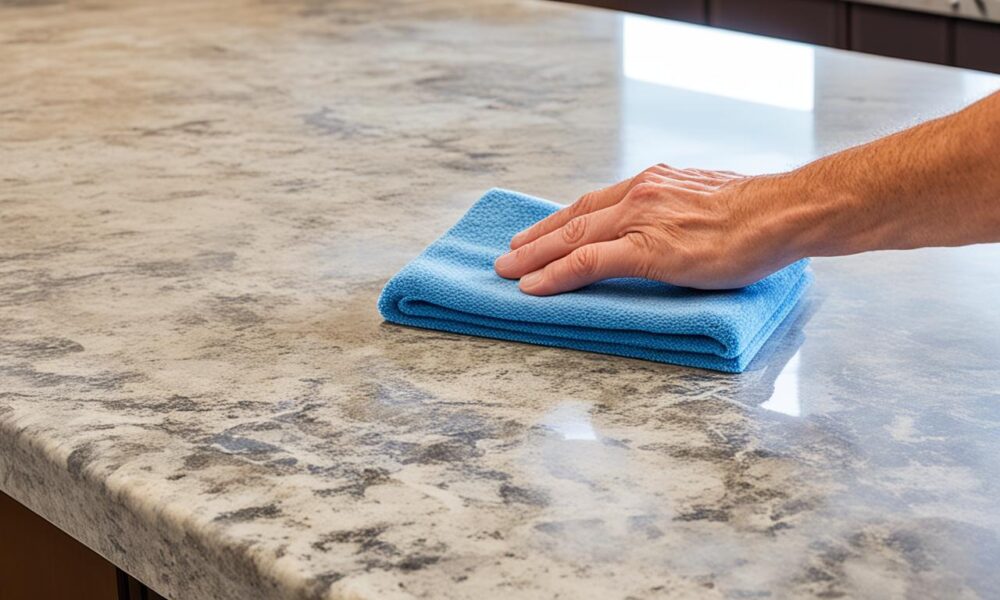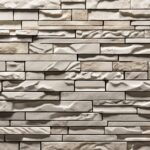Natural Stone Care and Maintenance: Expert Tips
Natural stone like marble and granite is not only timeless but tough. To keep them beautiful, they need the right care. Experts advise using cleaners that are pH-neutral. Avoid acids or bleach, as these can harm the stone. This is especially true for marble and limestone. These stones don’t like acids like lemon or vinegar because it causes etching1.
To clean regularly, follow the maker’s mixing guide. Use soft sponges or brushes. It’s key to quickly clean any spills to stop stains, mainly on marble and limestone1. If the stone gets damaged or looks worn, it’s best to call in professionals to restore its shine. Sealing your stone is also a must. It protects against stains. There are penetrating and enhancing sealers. Each one suits different stone types1.
Key Takeaways
- Natural stone needs the right care to stay beautiful and strong.
- To avoid damage, use pH-neutral cleaners and steer clear of acidic or bleach products1.
- Quickly cleaning spills, especially on marble and limestone, is crucial to prevent stains1.
- Fixing damaged stone is possible with professional restoration.
- Sealing it right assures long-lasting stain protection and extends the stone’s life1.
Understanding Your Natural Stone: Types and Composition
Understanding Natural Stone Types starts with their unique characteristics. Knowing the geological classifications and stone composition is key for effective Stone Cleaning Techniques.
Geological Classifications
Natural stone falls into three basic types based on how they’re formed: Sedimentary, Metamorphic, and Igneous2. Stones like limestone and sandstone come from mineral particles building up. Marble changes under heat and pressure, becoming a metamorphic stone.
Igneous stones, such as granite, form from cooling magma.
Calcareous vs. Siliceous Stones
Knowing if a stone is Calcareous or Siliceous is vital for proper care. Calcareous stones, like marble and limestone, are made mostly of calcium carbonate. They’re sensitive to acids, needing non-acidic cleaners for upkeep3.
Siliceous stones include granite and slate, made of silicates like quartz. Though more acid-resistant, they still require careful cleaning to avoid damage2.
Understanding Stone Composition Knowledge helps care for natural stones better. This ensures their longevity and beauty. The right sealing and geological knowledge guide proper maintenance24.
Routine Care for Natural Stone Surfaces
Maintaining natural stone surfaces properly is key. Regular cleaning with suitable products is crucial. This helps preserve the stone’s natural look and its strength.
Using pH-Neutral Cleaners
Experts stress the use of pH-neutral cleaners for stone care. Clean countertops and floors with these safe options. Avoid acid or bleach to prevent stone damage1. These cleaners protect the stone and any sealants. It’s best to follow the manufacturer’s directions for cleaning.
Avoiding Acidic and Abrasive Cleaners
Stay away from acidic and abrasive cleaners to maintain your stone. Marble and limestone are especially sensitive to acids like lemon juice and vinegar1. These can cause permanent etching. Abrasive substances can scratch and harm the surface, particularly polished stones.
Choosing the right stone cleaning products avoids damage. This practice helps keep the stone’s natural beauty and extends its life1. Using these care tips preserves the stone’s elegance and utility.
| Stone Type | Recommended Cleaner | Additional Care Tips |
|---|---|---|
| Marble | pH-Neutral Cleaner | Seal annually, clean spills immediately |
| Granite | Stone-Specific Cleaner | Less prone to staining, ideal for kitchens |
| Limestone | pH-Neutral Cleaner | Avoid acids, use soft cleaning tools |
| Quartzite | pH-Neutral Cleaner | Immediate spill cleanup to prevent staining |
| Quartz | Non-porous Surface Cleaner | Use heat pads to avoid thermal damage |
Heavy-Duty Cleaning Techniques for Natural Stone
Heavy-duty stone cleaners and degreasers can remove tough dirt and grease without hurting your stones. It’s key to follow the guidelines for these products. They get deep into the stone for a thorough clean.
Deep Cleaning with Degreasers
Using heavy-duty degreasers needs a specific approach for the best results. These solutions work deep to dissolve dirt without causing harm. Make sure you let the degreaser work as long as suggested to be most effective.
Steps for Effective Results
Follow these steps for great outcomes:
- Start by cleaning off any loose dirt with a vacuum or dust mop.
- Spread the cleaner evenly across the stone, following the product’s instructions.
- Give the product time to work its way into the stone as advised.
- Scrub with a soft brush to remove stuck-on grime and grease.
- Rinse well to make sure there’s no cleaner left, as it can re-attract dirt.
- Dry the area fully to stop water marks and mineral deposits from forming2.
- Change the cleaning water frequently to avoid putting the dirt back on the stone.
It’s vital to know the difference between Calcareous and Siliceous stones. Calcareous stones are soft and can be etched by acids2. Siliceous stones are tougher but still need to be looked after to prevent acid damage2. Use cleaners with a neutral pH for the best care of your cleaned stones5.
For a deep clean, consider hiring professional stone cleaning services. They know how to sterilize, disinfect, and bring back the stone’s shine6. Professionals give your natural stone a lasting beauty and strength.
Stain Removal: Effective Strategies and Products
When removing stains from natural stone, the approach changes with the type of stain. To fight organic stains on stone, mix 12% hydrogen peroxide or acetone with a powdered poultice7. Hydrogen peroxide or bleach helps remove ink stains from light stones. For dark stones, acetone or lacquer thinner is better7.

Dealing with copper and rust stains requires a bit more effort. Ammonia mixed with a powdered absorbent works for copper. Use diatomaceous earth and a commercial rust remover for rust7. For biological stains, a mix of diluted ammonia, hydrogen peroxide, or bleach is effective. However, never mix ammonia and bleach because it’s dangerous7. Water rings and spots? A neutral stone cleaner and soft cloth for buffing do the trick7.
It’s crucial to know what kind of stain you’re facing. Some older, deeper stains need more than just poultice—they might require stone polishing. Acidic substances can discolor and dull polished surfaces, especially marble8. Understanding whether stains are organic or inorganic helps set the right expectations for cleaning products’ success8.
Knowing stone porosity is key in choosing the right cleaning products. Marble is very porous, while granite is less so9. How often you seal the stone, either annually or semi-annually, also aids in preventing stains9. Some stains might be manageable at home with simple remedies like baking soda paste. Yet, severe cases often need a professional’s touch9.
The Importance of Sealing Natural Stone
Sealing adds an extra layer of protection for natural stone surfaces. It helps them resist stains and moisture. Even though some stones are naturally resistant, not sealing them can cause damage. This is true for stones like granite, which are harder to seal than polished marble10. Sealing is crucial right after installation to keep the stone looking good and lasting long. It matters for stones like marble, granite, and limestone11. For areas that get spills or stains, picking the right sealant matters a lot.
Applying a sealant is a key process in Protecting Natural Stone. With many sealants available, you must think about the stone’s type, finish, and where it is used. This ensures the best protection10. There are sealants for oil-based and water-based liquids. These are oleophobic and hydrophobic impregnators, respectively10. According to Sir Grout, sealing stops future stains and dirt. They offer many services for keeping stone surfaces clean and sealed, so homes stay beautiful and functional12.
Choosing the Right Sealer for Your Stone
When picking the right sealer, it’s all about the stone type and what you want to achieve. Different sealers provide different benefits, either protecting or enhancing the stone’s traits.
Penetrating/Impregnating Stone Sealers
Penetrating or impregnating stone sealers protect granite and marble from spills and acidic substances like vinegar and fruit juice13. They maintain the stone’s natural appearance and are perfect for both inside and outside use.
Stone Enhancer Sealers
Stone enhancer sealers work to enhance and deepen the stone’s color while offering protection. Yet, they might darken joints and seams. It’s key to choose based on the stone type and the look you desire.
In places with high foot traffic, like kitchen floors, regular sealing is a must13. Choosing between a stone protector or enhancer is essential for long-lasting beauty and protection. Use the right cleaners to avoid damaging the sealer and causing stains14.

Common Mistakes to Avoid When Cleaning Natural Stone
Avoiding mistakes when cleaning natural stone is key to keeping it beautiful and durable. Using acidic or harsh cleaners can harm stones like marble and limestone15. Vinegar, for example, can damage the sealing and cause stains16. It’s crucial to seal stone surfaces properly to protect them against stains and moisture15
Too much water during cleaning can also cause problems. It can lead to discoloration, stains, and even damage the stone’s structure over time15. Moisture that gets trapped can lead to mold or cracks17. Regular cleaning is necessary to avoid dirt and grime. Neglecting this can damage the stone’s look and its lastingness16. High-traffic spots should be cleaned more often to maintain their appearance17.
Choosing the right cleaning tools is crucial. Avoid abrasive brushes as they can scratch the stone16. Use pH-neutral, gentle cleaners instead. They prevent harm to the stone and its sealant15. Following these maintenance tips will help protect your stone surfaces for a long time.
Periodic resealing of the stone is also vital. Some stones, like marble and sandstone, might need to be resealed every year1716. Sealing helps guard against stains, water, sun damage, pollution, and frost16. Avoiding these common cleaning mistakes and keeping up with maintenance will ensure your natural stone stays beautiful and functional for many years.
Natural Stone Care and Maintenance: Expert Tips
To keep your natural stone looking great, follow some expert advice. It’s all about sticking to the right care routine. By following professional guidelines, you can create a care plan that suits your stone’s needs, keeping it in top shape.
Expert Recommendations
Using coasters and trivets is a basic but essential tip. They protect your stone from heat and acidic drinks, which is very important for marble and limestone surfaces. These stones are sensitive because they contain calcium carbonate and calcite1. Dust mopping is also crucial to avoid scratches from grit and sand.
Maintenance Frequency
Creating a maintenance schedule is key. It’s recommended to seal stone countertops right after installation for the best stain protection1. You should re-seal every few years, following the manufacturer’s advice to keep your stone looking new1. Remember, maintenance isn’t just about sealing.
Use cleaners that are pH-neutral to avoid damage. Cleaning up spills quickly and sticking to your care schedule is very important. Whether it’s daily, weekly, or as needed, sticking to a routine keeps your stone in excellent condition.
Besides the regular upkeep, products like MORE™ AntiEtch™ help stop acid damage and staining4. If stains or scratches do happen, stone care experts can usually fix them. This helps your stone stay both beautiful and functional4.
Professional Restoration and When to Seek Help
When your stone surfaces like marble or travertine get damaged, professional help is needed. Fixing etching, staining, and cracks go beyond simple DIY methods18. Stone restoration experts offer services like grinding and polishing. These processes can take one to two days to complete18.
For keeping your stone surfaces in top shape, it’s wise to hire professionals. Products like DryTreat give long-lasting protection with warranties up to 15 years4. These sealers are crucial for porous stones that easily stain19. Professional services can also take care of scratches and etches quickly4.
Choosing a stone restoration company? Look at their online reviews and get several quotes. Check their experience and if they’re insured18. Regular upkeep and professional deep cleaning keep natural stone looking its best19.
Sometimes, home care isn’t enough for stone surfaces. Only experts can truly restore them18. Knowing when to call in the pros is key to keeping your stone beautiful and durable19.
Embrace the Elegance of Well-Maintained Natural Stone
Well-maintained natural stone brings luxury and sophistication. It looks stunning in homes and businesses when cared for right. Regular checks and care are needed to protect it, especially in places with tough weather like Houston’s humidity20.
Early signs of damage, such as etching and chips, should not be ignored. If they are, repairs could become expensive20. Modern Stone Care in Houston offers services that keep stone looking great. They use the latest techniques and products made just for stone care20.
Home and business owners play a big part in keeping their stone beautiful. Daily cleaning and using coasters help a lot. Avoid trying to fix problems yourself, as it could make things worse20. The experts at Modern Stone Care also offer plans tailored to each stone’s care needs. These plans fit your life and budget, helping your stone look luxurious20.
Professional polishing brings back the stone’s shine, but ongoing care is crucial to keep it from getting dull20. With expert help and regular maintenance, stone surfaces can stay beautiful. This makes your property look and feel luxurious and sophisticated for years to come.
Source Links
- https://www.daltile.com/how-to/how-to-care-for-and-maintain-tile/how-to-care-for-and-maintain-natural-stone
- https://www.naturalstoneinstitute.org/consumers/care/
- https://restoreyourfloors.net/stone/the-ultimate-guide-to-caring-for-your-natural-stone-surfaces/
- https://thestonecollection.com/natural-stone-care-maintenance/
- https://worldofstonesusa.com/blogs/all/cleaning-maintenance-tips-natural-stones
- https://www.coit.com/blog/general-home-cleaning/simple-tips-safely-cleaning-natural-stone-surfaces
- https://cosmosurfaces.com/how-to-get-stains-out-of-natural-stone/
- https://cleanfax.com/stain-removal-for-stone-concrete-and-other-porous-surfaces/
- https://thestonerestorer.com.au/remove-stains-discoloration-natural-stone-tiles/
- https://restorationstoneworks.com/know-about-sealing-your-natural-stone/
- https://envirocleancapture.com.au/enviro-clean-and-capture-the-complete-guide-to-sealing-natural-stone-tiles/
- https://www.sirgrout.com/blog/the-importance-of-sealing-your-stone-and-tile-floors/
- https://granitegold.com/blogs/blog/natural-stone-sealing-tips-and-tricks
- https://dirtisgone.com/tips/natural-stone-cleaning-tips/
- https://www.marblestonepolish.com/avoid-these-common-mistakes-when-cleaning-natural-stone
- https://www.stoneworld.co.uk/article/top-5-natural-stone-cleaning-mistakes-to-avoid/
- https://cosmosurfaces.com/cleaning-natural-stone/
- https://stonecenters.com/blog/natural-stone-restoration-all-you-need-to-know
- https://corporatecare.com/surface-care/natural-stone-revitalization/
- https://restoreyourfloors.net/stone/the-importance-of-routine-professional-maintenance-for-natural-stone-surfaces/



